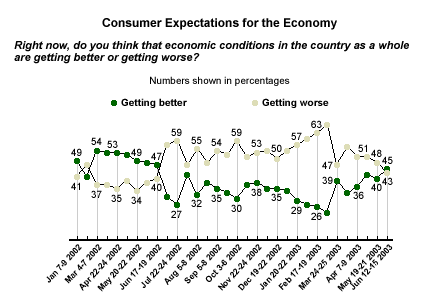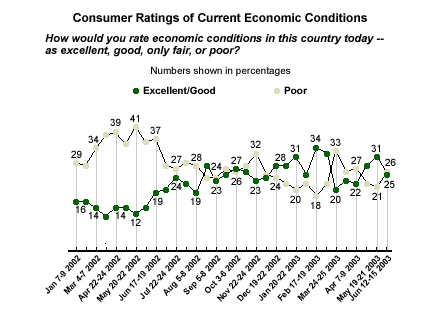Last Friday, it was reported that the University of Michigan's preliminary reading of consumer sentiment for June showed an unexpected decline. The equity markets responded negatively as some of the many investors betting on a strong economic recovery later this year took some money out of the market. This was a very prudent investor response, considering the modestly positive report on May retail sales (up 0.1%) released on Thursday, and the reports that job worries continue to dominate consumer perceptions.
In one sense, these new economic data reconfirm my view of the past two months that the much-hoped-for post-war economic "rally effect" in consumer confidence and spending was more illusionary than real. On the other hand, new Gallup Poll economic data suggest that the University of Michigan's latest consumer sentiment release may already be out of date.
Consumer Expectations Are Increasing
In sharp contrast to the University of Michigan's report that consumer expectations for the future of the economy are decreasing, Gallup's June 12-15 poll* shows that more consumers are saying economic conditions are getting better (45%) than are saying they are getting worse (43%). This is the first time more consumers have said conditions are getting better than getting worse since June 2002, when these percentages were very similar to the present numbers. It is also an improvement from the May 19-21 poll when 40% said conditions were getting better, and 48% said getting worse.

Consumer Assessments Have Improved
Similarly, the latest Gallup Poll shows an improvement in the public's rating of current economic conditions. Just about as many consumers say current economic conditions are "good" or "excellent" (26%) as say they are "poor" (25%) -- a differential of one percentage point (26% minus 25%). This is a substantial improvement over the way consumers rated the economy in Gallup's May 19-21, poll, when the differential was -10 percentage points, and in the May 5-7 poll, when the differential was -6 percentage points. However, today's ratings are still much lower than those of a year ago (June 17-19, 2002), when this differential was +18.

Why Is Gallup's Measure Better Right Now?
Why is Gallup's assessment of consumer opinion a more accurate measure than that of the University of Michigan right now? The temptation is to offer the fact that the University of Michigan's preliminary estimates are based on a much smaller sample than Gallup's as part of the reason. However, a more likely explanation lies in the monthly data comparisons being made using the consumer sentiment survey report. The monthly comparisons tended to overstate the positive impact of the war with Iraq on consumer perceptions, and entirely missed the almost immediate disappearance of the economic "rally effect." Now, the monthly data are finally reflecting that economic reality.
On the other hand, there are many things happening that should bolster consumer confidence, including:
- a major surge in the stock market -- maybe even a bull market -- providing both a positive wealth effect and improved investor expectations
- a major tax cut with checks being mailed next month and talk of an added cut for lower-income Americans that clearly has had a positive impact on the expectations of some consumers
- expectations that the Fed will cut interest rates next week -- possibly by 50 basis points
- further declines in long-term interest rates, which continue to help consumers improve their balance sheets
- the general expectation that policy-makers will do everything possible to get the economy moving before the presidential election campaign heats up
In my view, when it comes to consumer optimism, these positives trump today's continued job recession fears. And that is what Gallup's new poll data may very well be reflecting. The opposite reading of consumer perceptions, provided by last Friday's consumer sentiment report, is simply out of date by a few weeks.
Still, the current improvement in the consumer outlook remains fragile. We need the Fed to further lower rates and we also need Congress to send out those additional checks to lower-income Americans. No one should underestimate the negative consumer psychology associated with a jobs recession or the difficulty of breaking out of one.
*Results are based on telephone interviews with 1,006 national adults, aged 18 and older, conducted June 12-15, 2003. For results based on the total sample of national adults, one can say with 95% confidence that the margin of sampling error is ±3%.
